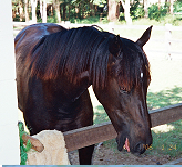Nothing is more devastating than going to the effort of getting your mare in foal , seeing that belly grow and then having your mare abort with only a couple of months pregnancy to go. Many things can cause mid to late term abortion in mares with most common being placentitis ( bacterial infection of the placenta and foetus) , herpes virus, and twins. In 2004, on some of the hunter valley horse studs, lots of mares lost their foals with unusual symtoms .This syndrome was named Equnie Ammnionitis and Foetal Loss (EAFL) These mares aborted with little or no warning having either dead or extremely sick foals. The main feature was that the amnion ( the white shiny sac part of the afterbirth) was thickened and inflamed. The syndrome closely resembled something that occurred in the usa in 2001 – 2002 when lost of mares aborted after contact with the eastern tent capterpillar which was called Mare Reproductive Loss Syndrome (MRLS).
Over the past few years research has been carried out to determine if caterpillars could be responsible for the new type of abortions in Australia . We do not have the eastern tent caterpillar here but we do have other types of hairy , processionary caterpillars ( those that crawl along in long lines behind each other). Studies confirmed that mares stomach tubed with crushed up caterpillars in the experiment aborted. Work is still being done to determine why mares abort after exposure to the caterpillars. it is suspected that the little hairs damage the lining or the mouth or gut and allow other types of bacteria in enter ands invade the blood stream of the pregnant mare and then end up in the uterus and placenta.
So how do we stop this ? Well procssionary caperpillars are found in native tress in areas of unimproved pasture. Most of the mares that aborted back in 2004 were in bush paddocks. Certainly examine any trees in your pregnant mares paddock for caterpillars or their nests and do not paddock mares where they are present (or have them exterminated).
Any mare that does abort should ideally have a full examination done on the afterbirth and foal to determine the exact cause of the abortion. Your vet needs to do this as soon after the abortion as possible. This syndromes can only be diagnosed by pathology tests and it will rule out other potential contagious causes of abortion such as herpes and also placentitis. Watch your pregnant mare closely – any sign of premature udder development ( more than a month before their due date) or vaginal discharge should be immediately reported to your vet. Try and keep pregnant mares in good paddocks , and in good condition and check for caterpillars !




































